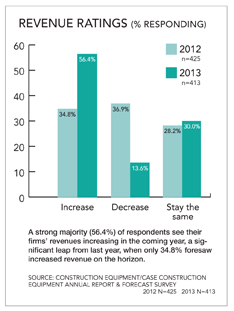Most economists say the U.S. is slowly emerging from the Great Recession, a view that was confirmed to some extent by an exclusive survey of 498 BD+C subscribers whose views we sought on the commercial construction industry’s outlook on business prospects for 2013.
The majority (52.2%) of respondents—architects, engineers, contractors, buildings owners, and others in the commercial, industrial, and institutional field—said their firms were in at least “good” financial health, compared to 49.7% last year.
But a markedly strong showing (86.4%) said their firms would be up in revenues or would at least hold steady in 2013, versus 80.2% last year—an increase that may be not only statistically significant but also most certainly welcome for an industry that could use a bit of cheering.
As was the case last year, more than three-fourths of respondents (75.7%) rated “general economic conditions (i.e., recession)” as the most important concern their firms will face in 2013—roughly comparable to the 78.4% who responded that way last year.
Economy Remains Top Concern for ’13
2013 2012
General economic conditions 75.7% 78.4%
Competition from other firms 44.9% 40.1%
Managing cash flow 37.6% 33.7%
Insufficient capital funding for projects 29.7% 34.5%
Softness in fees/bids 29.7% 28.0%
Government regulations/restrictions 26.6% 23.0%
Price increases (e.g., materials, services)15.7% 18.1%
Avoiding layoffs 16.4% 14.3%
Keeping staff motivated 14.3% 14.3%
Avoiding benefit reductions 11.9% 12.5%
Other factors were largely within the same range as last year, given the margin of error (about 3.5-4%). Competition from other firms (44.9%) went up slightly (from 40.1% in 2011), while having insufficient capital funding for projects declined a bit, to 29.7%, from 34.5% the year before. For both years, nearly three in four (73.4% this year, 74.8% in 2011) described the current business situation for their firms as “very” to “intensely” competitive—further evidence that AEC firms are still struggling for every dollar.
HEALTHCARE, DATA CENTERS LOOK PROMISING FOR ’13
Respondents were asked to rate their firms’ prospects in specific construction sectors on a five-point scale from “excellent” to “very weak.” (Respondents who checked “Not applicable/No opinion/Don’t know” are not counted here.) Among the findings:
- Healthcare continued to be the most highly rated sector, with nearly three-fifths of respondents (58.8%, vs. 54.6% last year) giving it a “good” to “excellent” rating.
- Data centers and mission-critical facilities were also up, with the majority of respondents (52.1%) in the good/excellent category, compared to 45.2% last year
- Senior and assisted-living facilities made a big jump, from last year’s 37.8% of respondents in the good/excellent category, to a majority this year, at 50.5%.
- Government and military work was rated good to excellent by 36.1% of respondents, down slightly from last year’s 41.1%.
- University/college facilities were rated good to excellent by 37.8% of respondents, versus 32.3% in 2011.
- Retail commercial construction got a slight vote of confidence, with nearly one-fifth of respondents (19.9%) stating they thought their firms would have a good to excellent year, nearly double last year’s 11.1%.
- Industrial and warehouse facilities might be staging a comeback: One-fourth (25.5%) of respondents whose firms engaged in that sector said they expect a good to excellent year in 2013; on the other hand, 35.8% said it would be weak or very weak.
Reconstruction—including historic preservation and renovations—accounted for at least 25% of work for more than a third (34.6%) of respondents’ firms, roughly the same as last year (36.3%). Office interiors and fitouts were down, with only 35.7% of this year’s respondents saying this sector would be good to excellent, compared to 42.7% last year.
The prospects for office buildings looked bleak, however, with only 15.6% saying that market would be good to excellent. The majority (55.2%) predicted office buildings would be “weak” or “very weak,” but that’s an improvement from 2011’s 67.3%.
The K-12 sector looked basically flat, with good/excellent responses from 22.9% of respondents this year, compared to 23.2% last year.
As for the use of building information modeling, one-fifth (20.2%) said their firm did not use BIM, about the same as in 2011 (20.6%). Of those who said their firms used BIM, a healthy 26.8% said BIM was used in the majority of projects, based on dollar value—precisely the same as last year. Only a few saw the use of BIM declining in the coming year. Nearly two-fifths (39.0%) of respondents said their companies would be beefing up their investments in technology.
On the communications front, nearly a third of respondents (32.9%) said they did not use social media. Of those who said they did, LinkedIn was the clear choice, at 85.1%, with Facebook in second place (49.5%) and Twitter bringing up the rear (21.1%).
Note: Of the 428 who gave their professional description, 42.1% were architects; 18.7%, engineers; 23.8%, contractors; 5.6% building owners, developers, or facility/property managers; and 9.8%, consultants or “other.” +
Related Stories
Healthcare Facilities | Dec 19, 2023
A new hospital in Duluth, Minn., is now the region’s largest healthcare facility
In Duluth, Minn., the new St. Mary’s Medical Center, designed by EwingCole, is now the largest healthcare facility in the region. The hospital consolidates Essentia Health’s healthcare services under one roof. At about 1 million sf spanning two city blocks, St. Mary’s overlooks Lake Superior, providing views on almost every floor of the world’s largest freshwater lake.
Government Buildings | Dec 19, 2023
New Pennsylvania State Archives building holds documents dating back to 1680
Work was recently completed on a new Pennsylvania State Archives building in Harrisburg, Penn. The HGA-designed, 146,000-sf facility offers numerous amenities, including computers, scanners, printers, a kitchenette with seating, lockers, a meeting room, a classroom, an interactive video wall, gallery, and all-gender restrooms. The features are all intended to provide a welcoming and comfortable environment for visitors.
Urban Planning | Dec 18, 2023
The impacts of affordability, remote work, and personal safety on urban life
Data from Gensler's City Pulse Survey shows that although people are satisfied with their city's experience, it may not be enough.
MFPRO+ News | Dec 18, 2023
Berkeley, Calif., raises building height limits in downtown area
Facing a severe housing shortage, the City of Berkeley, Calif., increased the height limits on residential buildings to 12 stories in the area close to the University of California campus.
Green | Dec 18, 2023
Class B commercial properties gain more from LEED certification than Class A buildings
Class B office properties that are LEED certified command a greater relative benefit than LEED-certified Class A buildings, according to analysis from CBRE. The Class B LEED rent advantage over non-LEED is about three times larger than the premium earned by Class A LEED buildings.
Codes and Standards | Dec 18, 2023
ASHRAE releases guide on grid interactivity in the decarbonization process
A guide focusing on the critical role of grid interactivity in building decarbonization was recently published by ASHRAE. The Grid-Interactive Buildings for Decarbonization: Design and Operation Resource Guide provides information on maximizing carbon reduction through buildings’ interaction with the electric power grid.
Architects | Dec 18, 2023
Perkins&Will’s new PRECEDE tool provides access to public health data to inform design decisions
Perkins&Will recently launched a free digital resource that allows architects and designers to access key public health data to inform design decisions. The “Public Repository to Engage Community and Enhance Design Equity,” or PRECEDE, centralizes demographic, environmental, and health data from across the U.S. into a geospatial database.
Sports and Recreational Facilities | Dec 15, 2023
San Antonio Spurs’ new practice facility aims to help players win championships and maintain well-being
Designed by ZGF, the Victory Capital Performance Center uses biophilic design to promote better health and wellness on and off the court.
Affordable Housing | Dec 14, 2023
What's next for affordable housing in 2024?
As 2023 draws to a close, GBBN’s Mary Jo Minerich and Amanda Markovic, AIA sat down to talk about the future. What’s next in terms of trends, technology, and construction of affordable housing?
75 Top Building Products | Dec 13, 2023
75 top building products for 2023
From a bladeless rooftop wind energy system, to a troffer light fixture with built-in continuous visible light disinfection, innovation is plentiful in Building Design+Construction's annual 75 Top Products report.

















